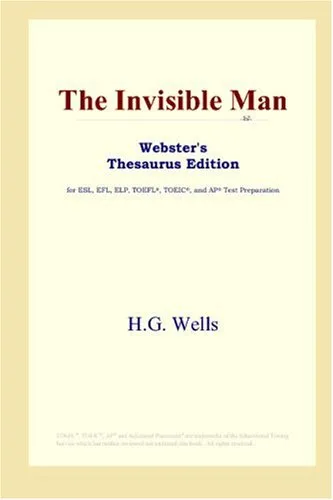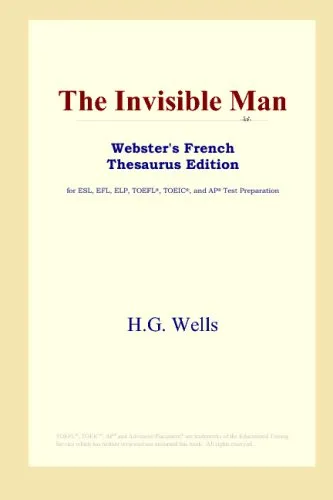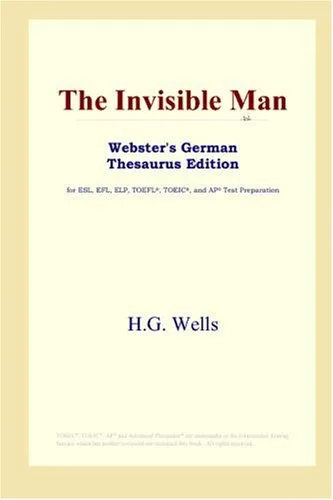The Invisible Man (Webster's Thesaurus Edition)
3.6
Reviews from our users

You Can Ask your questions from this book's AI after Login
Each download or ask from book AI costs 2 points. To earn more free points, please visit the Points Guide Page and complete some valuable actions.Related Refrences:
Introduction to 'The Invisible Man (Webster's Thesaurus Edition)'
Published in 1897, 'The Invisible Man' by H.G. Wells is a seminal piece of science fiction literature that continues to captivate readers over a century later. The 'Webster's Thesaurus Edition' enhances this classic by incorporating synonyms and vocabulary suggestions, offering readers deeper comprehension and an enriched reading experience. This edition blends Wells' pioneering narrative with a modern linguistic tool, broadening accessibility and engagement.
Detailed Summary of the Book
The narrative of 'The Invisible Man' unfolds with the arrival of a mysterious stranger at the English village of Iping. This stranger, who is perpetually swathed in bandages and clothed in weather-inappropriate attire, rents a room at the local inn. As the villagers grow more suspicious of his secretive behavior, it is eventually revealed that the stranger is Griffin, a scientist who has successfully turned himself invisible through a series of scientific experiments.
Invisibility, however, proves to be more of a curse than a boon. Griffin's earlier dreams of using his invisibility to amass power and wealth are foiled by the practical and social challenges it brings. He becomes increasingly isolated and desperate, resorting to violence and crime to sustain himself and further his goals. As his plight deepens, Griffin's psychological decline becomes evident, leading him to a path of destruction.
The story reaches its dramatic climax as the local residents, empowered by their unity against Griffin's aggression, rally to capture him. The narrative delves into themes of loneliness, power, and the boundaries of scientific exploration, making it not just an adventure tale, but also a poignant reflection on the human condition.
Key Takeaways
- **The Dual Nature of Science:** The novel illustrates the double-edged sword that scientific advancements can present, offering progress and potential threats simultaneously.
- **Isolation from Society:** Griffin's invisibility serves as a metaphor for social alienation and the consequences of extreme individuality.
- **Moral Responsibility:** The book poses questions about the morality of scientific experimentation and the responsibility that comes with knowledge and power.
- **Human Nature and Paranoia:** The fear of the unknown, as exhibited by the townsfolk, is a powerful reflection of human nature’s inherent suspicion and paranoia.
Famous Quotes from the Book
Here are a few of 'The Invisible Man's most thought-provoking and memorable quotes:
"I went over the heads of things a man reckons desirable. No doubt invisibility made it easier to enjoy them if one had safety to enjoy them: but it made it impossible to get them."
"I beheld, unclouded by doubt, a magnificent vision of all that invisibility might mean to a man - the mystery, the power, the freedom."
Why This Book Matters
'The Invisible Man' remains a cornerstone in the landscape of science fiction for several reasons. Firstly, H.G. Wells' exploration of scientific concepts and their ethical implications was ahead of its time and continues to be relevant in today’s technologically advanced society. The novel serves as a cautionary tale about the potential consequences of unchecked scientific experimentation and the isolation that technological superiority can bring.
Additionally, the book's exploration of themes related to invisibility speaks volumes about human psychology, examining how power, alienation, and identity can alter one's perception and morality. The 'Webster's Thesaurus Edition' further expands the text’s appeal, providing a broader comprehension that’s suitable for both students and aficionados of classic literature.
In conclusion, 'The Invisible Man' is not merely a story about literal invisibility but an intricate commentary on societal values, the pursuit of knowledge, and the inherent darkness within human nature. Through the lens of science fiction, Wells eloquently dissects human ambition, loneliness, and the moral quandaries they entail, ensuring the story's place in both academic discourse and popular culture.
Free Direct Download
You Can Download this book after Login
Accessing books through legal platforms and public libraries not only supports the rights of authors and publishers but also contributes to the sustainability of reading culture. Before downloading, please take a moment to consider these options.
Find this book on other platforms:
WorldCat helps you find books in libraries worldwide.
See ratings, reviews, and discussions on Goodreads.
Find and buy rare or used books on AbeBooks.






